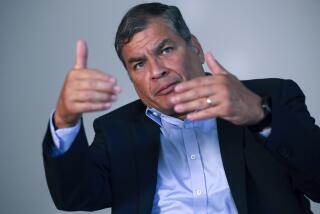A more mature Ecuador
- Share via
One measure of the political turmoil that has roiled Ecuador, the Colorado-sized country in the Andes, is its rapid turnover for presidents: eight in the last 13 years. So the recent reelection of Rafael Correa is a notable step toward a more mature democracy.
Correa, who took office in January 2007, last month became the first chief executive in 30 years to win reelection without a runoff. And thanks to his abundant spending on social programs and a new constitution that gives him a shot at staying in office until 2017, Correa’s popularity and staying power have now coalesced.
The Ecuadorean president is widely expected to use the political capital he has won to continue his country’s shift to the left. That’s worrisome to many American observers, especially because some of Correa’s most popular moves at home seem aimed at provoking the United States. He has intentionally defaulted on some of Ecuador’s debt payments, expelled U.S. diplomats accused of “meddling” and refused to renew the lease for the U.S. military base at Manta.
Correa’s success is a sign of stability for Ecuador, but whether he will turn out to be a permanent president like Venezuela’s Hugo Chavez or a leader who can lay the foundations for a sustainable democracy remains to be seen. What’s clear is that Washington must resist the urge to define the charismatic young president in overly simplistic terms.
Often, Correa is lumped into a sort of “axis of potential problems” with Chavez and Bolivian President Evo Morales. But although the three men share humble beginnings and leftist ideology, Correa is a neither a Fidel Castro-wannabe like Chavez nor a populist rabble-rouser like Morales. He is more complicated and more nuanced: If the former economics professor is not pro-American, neither is he anti-American.
There are many areas in which both the U.S. and Ecuador could benefit from greater cooperation -- immigration, drug policy, trade and energy reform to name a few. In particular, the Obama administration should seek Correa’s help in encouraging Colombia’s leftist guerrillas to release their hostages. As is often the case with Correa, it isn’t entirely clear where he stands with the rebels. Colombia says he has “links” to the group. Correa says he has urged them to free the captives. Just last month, the rebels announced they would negotiate to release a long-held hostage, partly at Correa’s request. Either way, he has influence it would be well worthwhile to cultivate.
More to Read
Sign up for Essential California
The most important California stories and recommendations in your inbox every morning.
You may occasionally receive promotional content from the Los Angeles Times.










